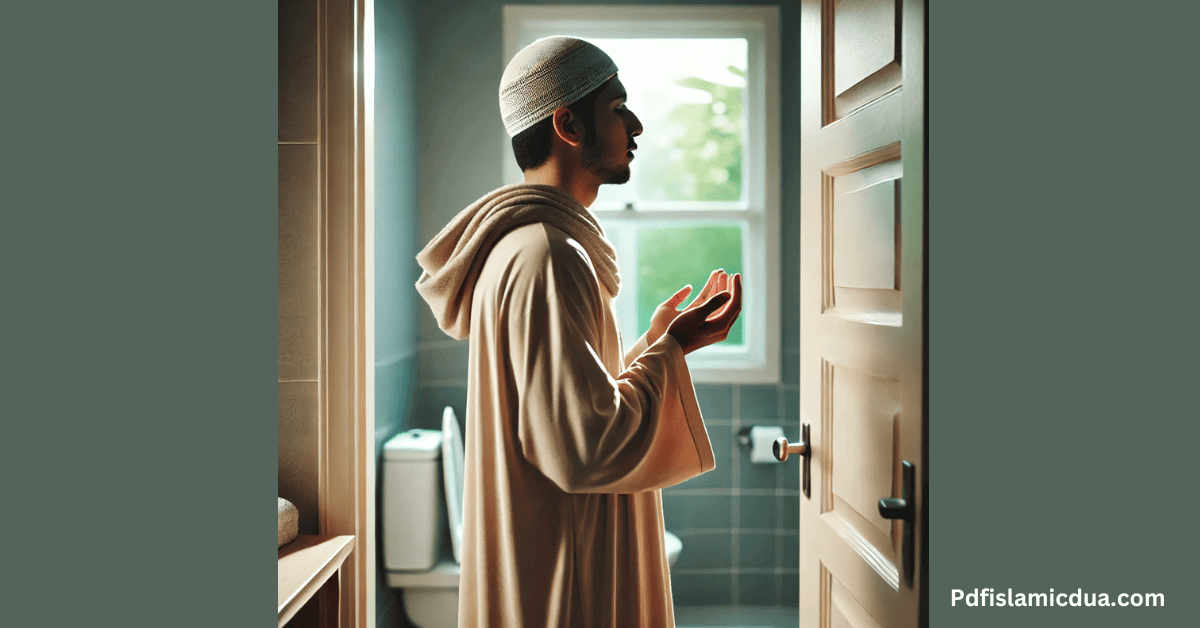Blog
Dua & Surah PDF
bathroom dua entering, dua after leaving the bathroom, dua before entering the bathroom, dua for bathroom, dua for entering and, dua for entering and leaving bathroom, dua for entering and leaving toilet, dua for entering and leaving washroom, dua for entering the toilet, dua for entering toilet, dua for entering washroom, dua for leaving toilet, dua to say before entering the bathroom, dua when entering the toilet, dua when leaving the toilet for kids
pdfislamicdua
0 Comments
Dua for Entering the Bathroom and Leaving – Sunnah Guidelines
Are you looking to learn the proper Dua for Entering the Bathroom and Leaving by following Sunnah? These simple yet powerful supplications protect us from impurities and reflect our mindfulness and connection with Allah in everyday actions.
Dua for Entering the Bathroom and Leaving the Bathroom
| Situation | Dua (Arabic) | Transliteration | Translation |
|---|---|---|---|
| Entering the Bathroom | اَللّٰهُمَّ اِنِّیْ اَعُوْذُبِکَ مِنَ الْخُبُثِ وَالْخَبَآئِثِ۔ | Allahumma innee aoothu bika minal-khubthi wal-khaba-ith | “O Allah (Almighty), I seek refuge in You from impure Jinnat (male and female).” |
| Leaving the Bathroom | غُفْرَانَکَ ، اَلْحَمْدُ لِلّٰهِ الَّذِيْ أَذْهَبَ عَنِّي الأَذَىٰ وَعَافَانِي | Ghufranaka, Alhamdu Lillahi Alladhi Adhhaba ’Anni Al-Adha Wa ’Afani | “I ask You (Allah) for forgiveness. All praises to Allah who has removed discomfort from me and granted me relief.” |
- Dua to Pass Exam with Good Marks – PDF Download
- Is Boycotting Haram or Halal? Islamic View on Palestine BDS
- Istikhara Dua PDF: Meaning, English & Urdu Translation
- Rabbana Taqabbal Minna Dua Full with English and Urdu Translation
Derivation
Anas bin Malik narrated:
“Whenever the Messenger of Allah entered the toilet, he would say: ‘A’udhu Billahi minal-khubthi wa’l-khaba’ith (I seek refuge with Allah from male and female devils).”
Anas bin Malik narrated:
“Whenever the Prophet exited the toilet, he would say: ’Al-hamdu lillahilladhi adhhaba ’annial-adha wa ‘afani (Praise is to Allah Who has relieved me of impurity and given me good health).’
- Is Doritos Halal or Haram? Everything You Need to Know
- Allahu Yashfeek Meaning in English with Benefits
- Is Boycotting Haram or Halal? Islamic View on Palestine BDS
Benefits of Reciting the Dua for Entering the Bathroom and Leaving
- Seeking Protection:
- We ask Allah to protect us from impure and harmful forces by reciting Dua for Entering the Bathroom, ensuring our spiritual safety.
- Conscious Devotion:
- This dua reflects mindfulness in everyday actions, reminding us to stay connected to Allah even in routine tasks.
- Spiritual Reward:
- Although not obligatory, reciting these duas earns spiritual rewards as it aligns with the prophetic Sunnah.
Sunnah and Etiquettes of Entering the Bathroom and Leaving
- Enter with the Left Foot First: Demonstrates humility and cleanliness.
- Say the Dua Before Entering: Seek Allah’s protection from harmful entities.
- Exit with the Right Foot: Symbolizes returning to purity and divine presence.
- Recite the Dua After Exiting: Show gratitude for health and well-being.
- Maintain Silence: Avoid conversations and distractions while inside.
- Ensure Cleanliness: Leave the toilet in a hygienic state for others.
- Respect Privacy: Lock the door and honor personal spaces.
- Avoid Facing the Qibla: Show respect for sacred directions.
- Use Water for Purification: Highlight the importance of cleanliness in Islam.
- Remember Allah Upon Exiting: Reflect mindfulness in all actions.
Importance of Cleanliness in Islam: Summary with Prophetic Teachings
1. Quranic Guidance
- Allah emphasizes cleanliness and purity:“Truly, Allah loves those who turn to Him constantly and He loves those who keep themselves pure and clean.” (Surah Al-Baqarah 2:222)
2. Prophetic Teachings
Prophet Muhammad (ﷺ) greatly emphasized cleanliness, considering it a part of faith and daily practice:
- “Cleanliness is part of faith.” (Sahih Muslim)
- The Prophet (ﷺ) encouraged maintaining personal hygiene, environmental cleanliness, and neatness.
- He said: “The key to the prayer is purification.” (Sunan Abu Dawood)
- Abu Hurayra reported that the Messenger of Allah, may Allah bless him and grant him peace, said, “Five things are included in the fitra:
- trimming the moustache, cutting the nails, shaving the pubic hair, plucking the armpits, and using the siwak (arak stick for cleaning the teeth).”Book 53, Hadith 14
Key Areas to Keep Clean
Body
- Bathing: Bathe daily to ensure cleanliness.
- Wudu: Perform ablution before every prayer to maintain purity.
- Hygiene After Toilet: Clean properly and dry thoroughly.
- Handwashing: Regularly wash hands, especially before meals.
Hair
- Wash hair regularly.
- Keep it brushed and presentable.
Teeth
- Brush teeth at least twice daily, including before Wudu.
- The Prophet (ﷺ) recommended Miswak for better oral hygiene and spiritual reward.
Nails
- Trim nails weekly, preferably on Fridays as recommended in Islam.
- Scrub nails daily to avoid germ buildup and prevent disease.
Clothes
- Wear clean clothes at all times.
- Avoid wearing dirty clothes after bathing.
- Ensure clothes remain clean even when using the toilet.
Mind
- Maintain purity of thoughts and intentions.
- Engage in acts of worship such as prayer and fasting to cleanse the mind and soul.
- The Prophet (ﷺ) said: Verily Allah does not look to your faces and your wealth but He looks to your heart and to your deeds.” (Sahih Muslim 2564c)
Surroundings
- Keep homes, neighborhoods, and public places clean.
- Dispose of garbage properly and avoid littering.
- The Prophet (ﷺ) said: “to remove a harmful thing from the way is also Sadaqa.”.” (Sahih al-Bukhari 2989)
Start practicing these duas today to stay connected with Allah in every aspect of your life! If you have any doubts or queries, please comment below.














Post Comment